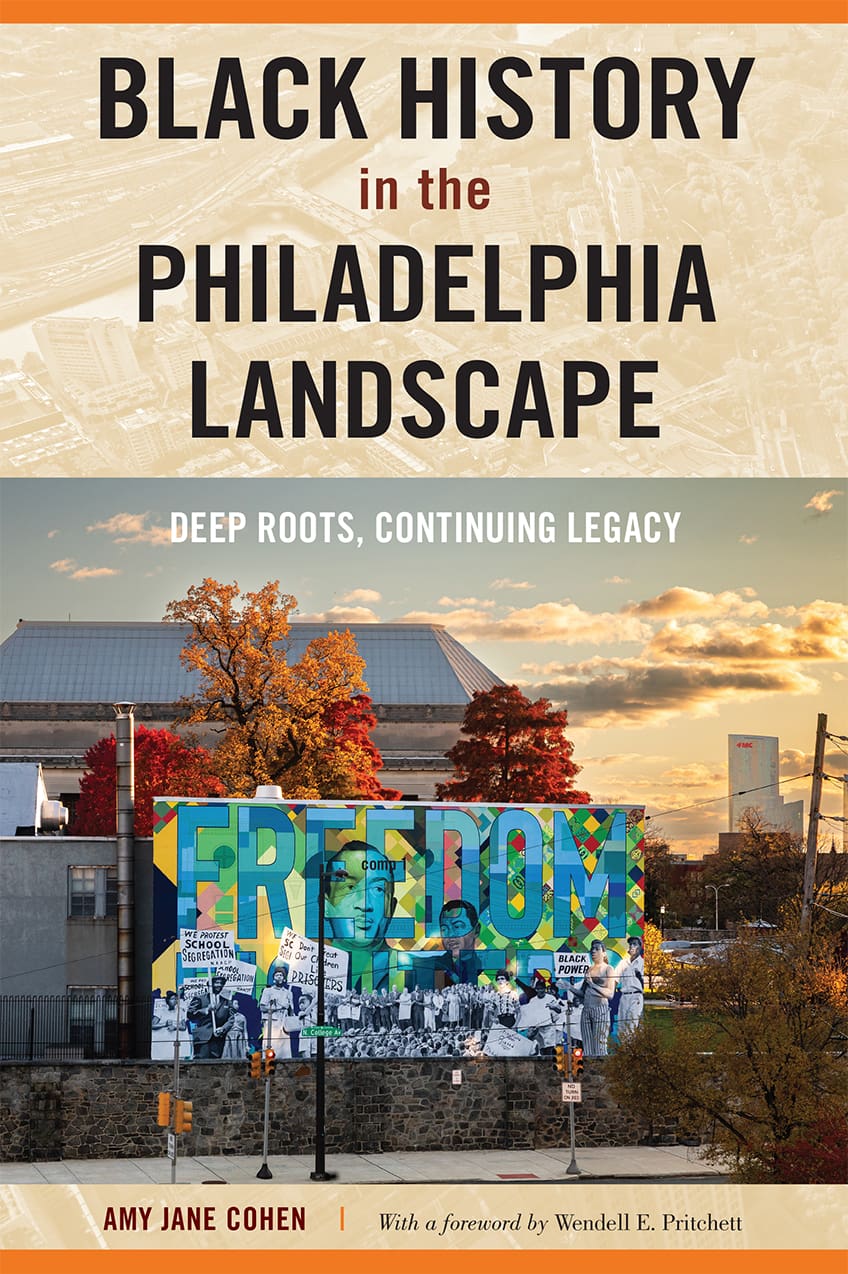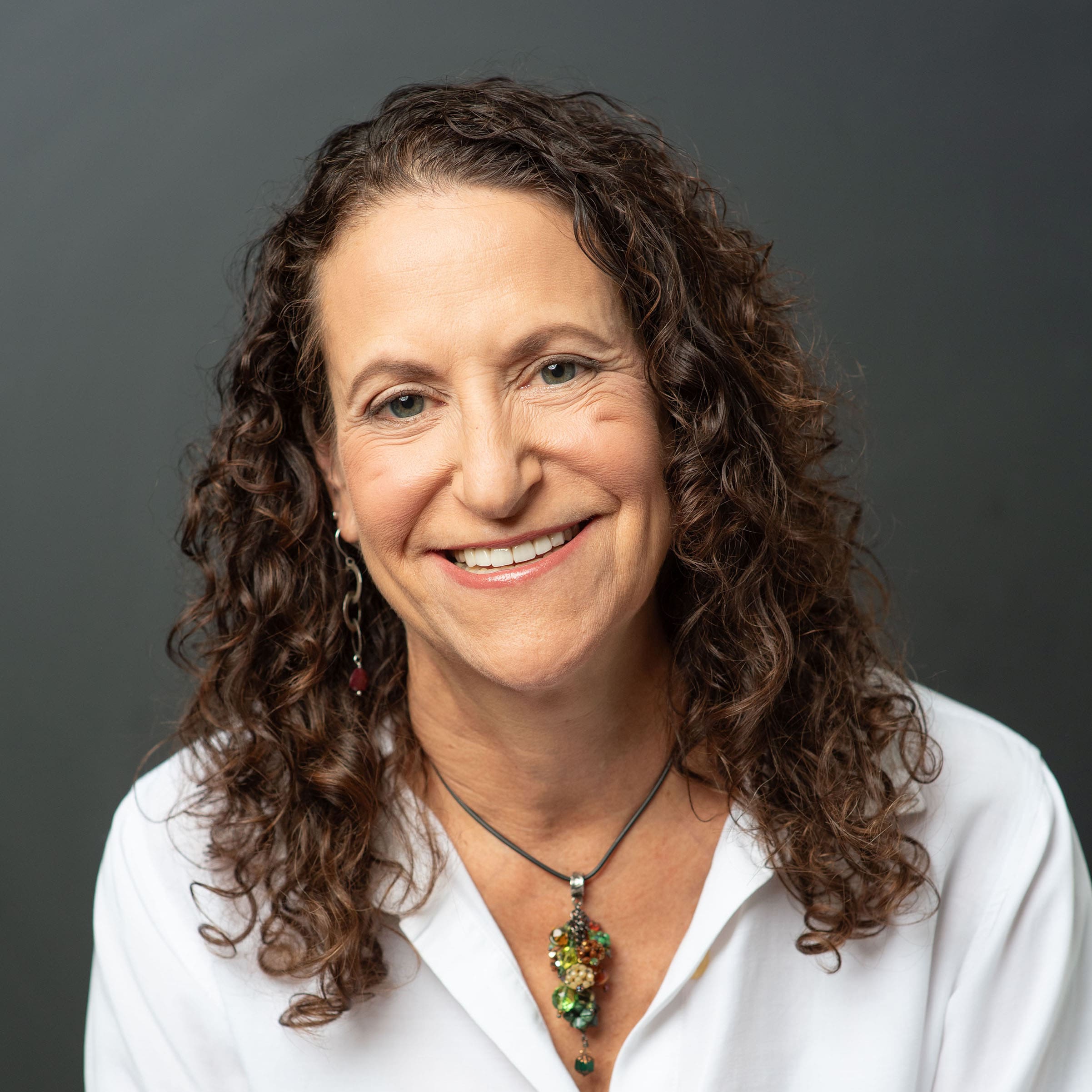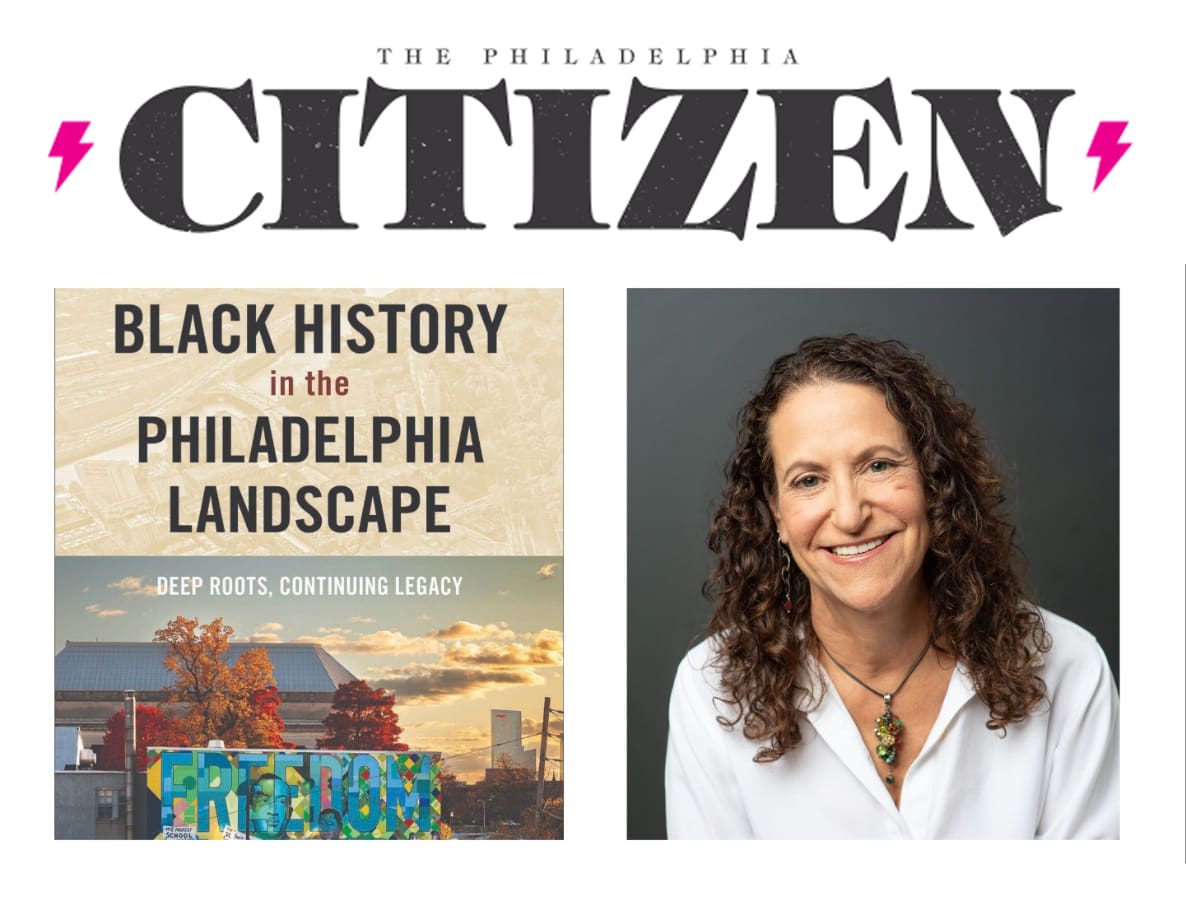Press
Praise for Black History in the Philadelphia Landscape: Deep Roots, Continuing Legacy by Amy Jane Cohen.
Review
Book Review by Lindsay Gary
June 17, 2025, Broad Street Review
Amy Jane Cohen’s Black History in the Philadelphia Landscape: Deep Roots, Continuing Legacy is a landmark text: a must read for all Philadelphians, and Americans. Cohen thoughtfully illustrates Philadelphia’s Black history through landscape and legacy, offering a chronological overview of important sites and structures as well as individuals and institutions. While not exhaustive, as Cohen notes in the introduction, the book is an excellent starting point in covering and uncovering history from the colonial era to the Black Power Movement.
A self-identified “white person”, Cohen adds that she’s aware that some may be critical of her writing a book on Black history. Understandably so. However, it is important to note that Cohen uses her privilege thoughtfully, having sought the counsel of Black historians and culture bearers, such as the city’s beloved Charles Blockson, and amplifying their contributions throughout the text. A diplomatic writer, she also directly yet gently reframes the white public’s historic understanding of Philadelphia—not just a city of liberty and brotherly love but one of colonization, enslavement, and violence. This provides an important context for understanding the development of Black Philadelphia.
Review
Book Review by Menika B. Dirkson
August 28, 2024, Journal of Urban Affairs
Black History in the Philadelphia Landscape: Deep Roots, Continuing Legacy is an accessible and sweeping history that serves as a bridge between historical archives and the community. This book encourages readers to be knowledgeable about the historical significance of their neighborhoods and instructs them to be advocates in the preservation of historic landmarks. Stories like the creation of the Christian Street/Black Doctors Row Historic District in July 2022 that honors the Black community, Black medical institutions like Douglass Hospital and Mercy Hospital, and Black doctors who lived and worked on that street from approximately 1910 to 1945 demonstrate how historic districts under the threat of erasure from public memory in gentrified communities like Graduate Hospital can acquire historic designations and pass moratoriums on demolition when residents, historic preservation organizations, and politicians work together to protect historic sites. Embedded in this text are numerous stories of how community activists and everyday people have protected Black history in Philadelphia, and have successfully nominated and acquired historical markers, murals, and monuments in their communities by collaborating with academics, archivists, museum educators, artists, and even politicians to change their city’s historical landscape and “repair the past” when Black history was often invisible, forgotten, or devalued. Moreover, this book is fitting as a guidebook, antiracist teaching manual, or simplified textbook for students in sixth through twelfth grade, college students, and everyday people who want to learn intersectional African American history through a public history lens.
Radio
Amy Jane Cohen appears on History Matters
June 14, 2024, The Green
Despite not being as well known as other leaders of his time, Absalom Jones’ legacy is still felt today. Born into slavery in 18th-century Delaware at a time when slavery was being debated as immoral and undemocratic, Jones would go on to become America’s first Black Episcopal priest and founder of both the first Black Episcopal congregation and the first ‘Free African Society.’
In this edition of History Matters, Delaware Public Media’s Kyle McKinnon sits down with Philadelphia-based writer and educator Amy Jane Cohen for a closer look at Jones’ life and lasting influence ahead of Juneteenth.
Opinion
How did a white woman come to write the newest definitive text on Philadelphia’s Black history?
April 18, 2024, The Philadelphia Inquirer
For the past two months, author Amy Jane Cohen has been lecturing about Philadelphia’s Black history to predominately white audiences at libraries, bookstores, and exclusive private clubs in the city and the burbs.
“Black people have been [in Philadelphia] much longer than most people and have had a continuous and important presence,” Cohen, a former high school African American history teacher, recently told the Northeast Philadelphia History Network. “Black people have been the ones to push forward our country’s ability to live up to its ideals about equality for all.”
The crowd listened. Some nodded.
Featured Book
Black History in the Philadelphia Landscape
February 5, 2024, The Philadelphia Citizen
A veteran Philadelphia social studies teacher wrote a new book about Black Philadelphia history.
When it comes to Black Philadelphia history, like many well-read locals, Amy Jane Cohen, “had what I confess was a typically Yankee perspective,” she writes in her new book, Black History in the Philadelphia Landscape: Deep Roots, Continuing Legacy. “Lynching, Jim Crow and voter suppression were part of southern history. The North, by contrast, was the home of abolitionism, the Underground Railroad, and the Harlem Renaissance … “
In 2005, the School District of Philadelphia required all high schools to teach a course in African American history. Cohen, then teaching social studies at Masterman, volunteered — and became “quickly disabused of the myth of stark regional difference.” Black History … follows a clear path from the Isabella, the first slave ship to unload its human cargo into the port of Philadelphia in 1684, through the Civil Rights movement, to today, bringing to light revelatory and actionable details.
In the News
A New Book Looks at Philadelphia’s Black History, Century by Century
February 27, 2024, Hidden City
There have been efforts to make our commemoration of Philadelphia’s history more inclusive. The state’s historical marker program, the Philadelphia Historical Commission, and a wide swath of cultural and educational organizations have been increasingly focused on the city’s Black history throughout the centuries and the neighborhoods.
A new book by Philadelphia-based educator, writer, historian, and Hidden City contributor Amy Jane Cohen is the latest contribution to that endeavor. Black History in the Philadelphia Landscape: Deep Roots, Continuing Legacy, published by Temple University Press, traces events surrounding and contributions of Black Philadelphians from the founding of the city in the late 17th century through the 20th century.
In the News
Exploring monumental developments in Black history at Stenton Museum
April 13, 2024, The Philadelphia Sun
Black history monuments have become a sizzling topic at Stenton Museum, which is located at 4601 N. 18th Street, near Wayne Junction.
Writer, educator, and historian Amy Jane Cohen gave an illustrated talk at Stenton recently based on her book, “Black History in the Philadelphia Landscape, Deep Roots Continuing Legacy,” published by Temple University Press this past February.
In the News
Temple hosts conversation on new book highlighting Philadelphia’s Black history
February 29, 2024, Temple Now
After years of researching Black history as both an educator and historian, Amy Jane Cohen was spurred to become a book author.
“I had the idea of turning what I learned over 20 years into a book,” Cohen said.” I had some trepidation as a white person entering Black history space, but I channeled Toni Morrison who says, ‘If there is a book you want to read and it hasn’t been written yet, then you must write it.’”
In the News
A Book Celebrating Black History in Philadelphia
February 28, 2024, Temple University Press
Opinion
Philly’s Black history can be seen through its landscape
February 7, 2024, The Philadelphia Inquirer
“In Amy Cohen’s able hands, the history of Philadelphia is Black history, from the enslaved laborers who built the eighteenth-century city and the Black abolitionists who fought to end slavery to the activists who led the city’s civil rights and Black Power movements. As if that were not enough, Cohen also highlights the vital contributions of Philadelphia’s public historians, whose advocacy for historical markers and memorials has inscribed Black history into the city’s built environment. Black History in the Philadelphia Landscape is essential reading for all who value honest and unapologetic assessments of the nation’s past.”
Matthew J. Countryman
Associate Professor of African American and African Studies and History at the University of Michigan, and author of Up South: Civil Rights and Black Power in Philadelphia
“A polyvocal collection of hidden histories beaming a black light on spectacular intersectional lives who have made Philadelphia, this book helps unmute lost legacies of its public spaces and rethink stories of cityhood. Cohen offers an actionable Black atlas for navigating the nation’s most historic city—whether as a student, a visitor, or an everyday resident. Moreover, packaging this pluriverse of global Black history made locally provides an urgent model for practicing love of place by expanding who embodies the ‘echoes of heritage’ in America. The window is now wider for inviting more colorful, just futures.”
Matthew Jordan-Miller Kenyatta
Lecturer in the Department of City and Regional Planning at the University of Pennsylvania, and contributor to The Black Geographic: Praxis, Resistance, Futurity

Black History in the Philadelphia Landscape
Black Philadelphians have shaped Philadelphia history since colonial times. In Black History in the Philadelphia Landscape, Amy Cohen recounts notable aspects of the Black experience in Philadelphia from the late 1600s to the 1960s and how this history is marked in the contemporary city.











